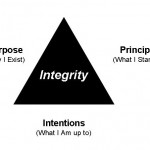

What can I lean against? What can I trust in? What can I pursue with reckless abandon? So many of us have been burned by relationships, by people going back on their word, claiming that they said something when they did not say it.

He does what he says, and his covenant love is always dependable. Therefore, God’s character and the promises he makes are supremely worthy of our trust and commitment. His love, his truth and his goodness are not governed by external circumstances or conditions – they never vacillate. His promises are as good as his unchanging character: “Jesus Christ is the same yesterday, today and forever” (Hebrews 13:8). But God will never let us down, because he never changes. Is there anyone we can trust? People let us down again and again, because there is often a discrepancy between what they claim to believe and how they actually live. In the words of John Ortberg, “Disciplined people can do the right thing at the right time in the right way for the right reason.” Just like God. Christ’s objective for his disciples is to make us disciplined people. His actions and behaviors always match his character and nature. Perhaps a good word to think of is “consistency.” There must be consistency between what is inside and what is outside. Biblical integrity is not just doing the right thing it’s a matter of having the right heart and allowing the person you are on the inside to match the person you are on the outside. That’s the point: it always comes down to the issue of character, not just words. God can be trusted because he is trustworthy. Throughout the Scriptures, God focuses on the fact that he is a God who makes and keeps his covenants, that he can be trusted (1 Chronicles 16:15 Psalm 105:8). We give lip-service to the importance of character, but we have the idea that when things get tough, the rules can be changed and commitments and covenants may be discarded at will.īut the Bible makes clear just how important our covenants are. We often seem more concerned with convenience and performance. Promises and commitments are significant, though, in our day of Machiavellian ethics, it seems that they have become optional.


They want to know that leaders will keep promises and follow through on commitments. People want to know that their leader can be trusted. As a result of this practice, Samuel’s leadership has become legendary as this story has been told and retold throughout the centuries. He opened himself up to the scrutiny of everyone with whom he had ever had dealings. Samuel held himself accountable to the people he led. These two characteristics directed how he regarded his possessions, his business dealings and his treatment of those who were weaker than himself. Samuel’s honesty and personal integrity permeated every area of his life. Not one person rose up to make a claim against Samuel. What a promise! Even more impressive was the people’s response. “You have not taken anything from anyone’s hand.”ĭuring his farewell speech, after having led Israel for decades, Samuel promised to repay anything he had unjustly taken from anyone. “You have not cheated or oppressed us,” they replied. Whose ox have I taken? Whose donkey have I taken? Whom have I cheated? Whom have I oppressed? From whose hand have I accepted a bribe to make me shut my eyes? If I have done any of these, I will make it right.” Testify against me in the presence of the Lord and his anointed. I have been your leader from my youth until this day. As for me, I am old and gray, and my sons are here with you. Samuel said to all Israel, “I have listened to everything you said to me and have set a king over you. Nowhere is this best illustrated than in 1 Samuel 12:1-4: In light of this research, Israel’s high regard for Samuel comes as no surprise. They want to know that he or she will keep promises and follow through with commitments. That makes sense, doesn’t it? If people are going to follow someone, whether into battle or in business or ministry, they want assurance that their leader can be trusted. In virtually every survey, honesty or integrity was identified more frequently than any other trait. After surveying thousands of people around the world and performing more than 400 written case studies, James Kouzes and Barry Posner identified those characteristics most desired in a leader.


 0 kommentar(er)
0 kommentar(er)
